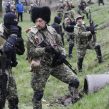
Cossacks Split Between Claiming to Be an Ethnic Group or a Social Class
Publication: Eurasia Daily Monitor Volume: 12 Issue: 195
By:

On October 17, Cossack groups with combat experience held a conference in the city of Mineralnye Vody in Stavropol region. According to the organizers, the conference participants were veterans of the conflicts in Chechnya, Transnistria, Tajikistan, South Ossetia, Abkhazia, Crimea, Karabakh, and the Donetsk and Luhansk regions. These Cossacks call themselves the “Wolf Hundred” (“Volchya Sotnya”) and present themselves as the “true Cossacks” who fight for Russia and the Cossack people. One of the organizers of the conference, Tikhon Karetny, said the reason for the gathering was the increased external and internal threats to the Cossacks and Russia. He said the Cossacks should always be ready to take up arms to defend themselves. While the Cossacks position themselves as the defenders of Russia, on the other hand they indirectly criticize Moscow for dividing the Cossacks and imposing leaders who only work for money (Kavkazskaya Politika, October 23).
The irony of the Cossacks’ alarmism is reflected in the impressive and quite telling geography of their engagement. The Cossacks always appear to fight beyond Russia’s borders. Even though the Cossacks speak of “defending Russia,” what they in fact do is lead Russian wars of aggression in other post-Soviet countries. The other glaring contradiction is the Cossacks’ goal of defending the Cossack nation and their servile relationship to Russian authorities. The Cossacks themselves recognize that Moscow is dividing them and trying to weaken them in a variety of ways. At the same time, the Cossacks appear to be docile actors who willingly carry out Moscow’s orders to interfere or initiate conflicts both near and far away from Russia’s borders.
One of the primary issues connected to the Cossacks’ role in contemporary Russia is whether they identify themselves as an ethnic group or a social class. Vladimir Gromov, a Cossack leader and deputy in the Krasnodar regional parliament, said in an interview with the Kavkazskaya Politika website: “I understand that the government is motivated by its immediate, shortsighted interests, choosing the simplest of all ways. They think that it is sufficient to put a Cossack uniform on a person and he will become a Cossack. In fact, the authorities are now creating a quasi-social class. And this is a destructive path.” According to Gromov, the North Caucasian peoples have traditionally regarded the Cossacks as a nation and had friendly relations with them. However, when the government gives the Cossacks policing responsibilities, relations between the North Caucasians and the Cossacks become characterized by conflict (Kavkazskaya Politika, October 21).
Yet, the government has pursued precisely this type of policy toward the Cossacks in the North Caucasus: for example, from behind the scenes, it has repeatedly pushed the Cossacks to start patrolling the streets in Maikop and other cities in the Republic of Adygea. This city is not known for particularly high crime levels, so it is entirely unclear why it needs additional patrols in the first place. The Russian government did not officially require Adygea to adopt Cossack patrols; instead, the government increased financing for the Cossacks, which allowed them to raise their numbers from 400 to 4,330 Cossacks (a nearly 11-fold increase) over the span of just a few months. The Cossacks call their patrols “voluntary,” but they receive payment by the state for their “voluntary” service. The Cossacks say anybody can take part in the voluntary patrols, but do not mention that not everyone can receive government funding for their “voluntary” service (Kavkazskaya Politika, September 6).
The paradox of the Cossacks being at once an ethnic group and a privileged social class has sparked criticism even from some pro-Kremlin analysts. The critics are especially concerned about the Cossacks’ boundless militarism, which has little if any legal foundation in the existing Russian laws. Referring to the murky legal description of the Cossacks, the pro-Kremlin analyst and activist Maksim Shevchenko wrote: “If the Cossacks are a people, why does the president of Russia appoint the leader of Cossack nation by a presidential decree?” (Kavkazskaya Politika, October 21).
The lack of clarity about the status of the Cossacks may be quite deliberate. The Cossacks have helped Moscow wage war in post-Soviet countries, thereby providing a disguise that the Russian army could use to participate in conflicts. Now, some Cossack forces have been dispatched to contain North Caucasian migration to those areas the Russian authorities deem to be ethnic Russian homelands. The former governor of Krasnodar region and current Russian agriculture minister, Aleksandr Tkachyov, provided the most comprehensive testimony concerning this function for the Cossacks in 2012, when he said the Cossacks could harass North Caucasian migrants while the police were legally prevented from doing so (Yuga.ru, August 2, 2012). After Tkachyov was promoted to the position of agriculture minister, it became abundantly clear that the Kremlin is promoting Russian nationalism and regards the Cossacks as an important tool in carrying out a policy of repressing ethnic minorities and the opposition in Russia.




